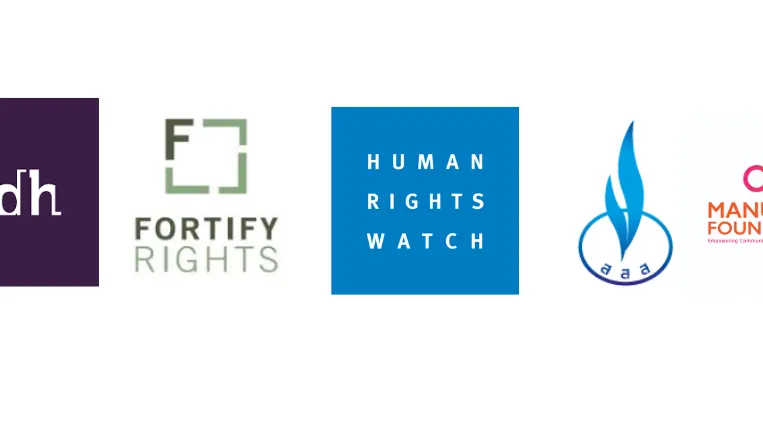Joint letter on prison conditions and COVID-19
19 July 2021

Somsak Thepsutin
Minister of Justice
404 Chaeng Wattana Road,
Thung Song Hong, Lak Si,
Bangkok, Thailand
Bangkok, 19 July 2021
Re: Urgently address overcrowding, protect prisoners’ health during COVID-19 crisis
Dear Mr. Somsak,
We, the undersigned national and international human rights organizations, reiterate our calls for the Ministry of Justice to take urgent measures to address ongoing overcrowding and the COVID-19 crisis in prisons across the country.
In mid-April of 2020, during the early stages of the pandemic, we sent a joint letter to the Department of Corrections in which we expressed our gravest concern over the potentially disastrous impact of the pandemic on the prison population and prison staff in Thailand. One year later, COVID-19 cases surged in the Thailand’s prison system amid a new wave of virus transmissions that hit many parts of the country beginning in April 2021.
On 12 May 2021, the Department of Corrections revealed that 1,795 out of 3,274 prisoners (72%) in Bangkok Remand Prison and 1,040 of the 4,475 inmates (30%) at the Central Women’s Correctional Institution in Bangkok had tested positive for the virus that causes COVID-19. The severity of the COVID-19 situation in the Thai prison system only surfaced after several prominent pro-democracy activists held in these prisons tested positive for the virus during their pre-trial detention or shortly after being released on bail. Between 12 May and 15 July 2021, 38,019 inmates in prisons across Thailand were infected with COVID-19. This number represents about 12% of the total prison population.
Prison overcrowding and the spread of COVID-19 are closely interrelated and should be urgently addressed to prevent a further deterioration of conditions in correctional facilities.
Despite announcements relating to the provisional release of certain inmates in order to decongest prisons, Thailand’s prison population has not significantly decreased since the start of the third COVID-19 wave. According to statistics from the Department of Corrections, from 1 April to 1 July 2021 the total prison population decreased by a mere 0.2%, from 307,910 to 307,007.
We urge you to take all immediate and necessary steps, including at the policy level, to tackle the ongoing overcrowding in prisons. We welcome the Ministry’s plan to amend legislation on narcotics in a manner that would lead to the release of inmates incarcerated on minor drug-related offenses and we urge you to accelerate this amendment process.
We also recall the recommendations we previously made on the conditional release of certain categories of prisoners currently detained for non-serious and/or non-violent offenses. These include: prisoners over the age of 60; sick prisoners, particularly those with underlying medical conditions; prisoners awaiting trial; prisoners sentenced to terms of up to two years; prisoners with one year or less left to serve; prisoners detained for immigration offenses; pregnant women; and those detained without sufficient legal basis. Those released may be subjected to appropriate non-custodial measures, in accordance with the Standard Minimum Rules for Non-custodial Measures (the “Tokyo Rules”).
Ongoing reports of many prisoners who test positive for COVID-19 raise concern over the seriously inadequate detention conditions, prevention measures, and medical care during the escalating COVID-19 outbreaks.
We welcome the various urgent measures – such as testing, quarantines, and transfer of certain infected inmates to medical facilities outside prisons – introduced by the Department of Corrections to control the further spread of the virus in correctional facilities since the latest rise of COVID-19 infections in prisons, and a testing as well as a 14-day quarantine requirement for released prisoners.
However, these measures do not go far enough to prevent further outbreaks of COVID-19 in correctional facilities. Since they are at high risk of contagion, authorities should accelerate the COVID-19 vaccine rollout across all prisons. Prisoners who have tested positive for the virus must have access to appropriate medical care and treatment equal to the general public, without discrimination and undue delay.
In addition, for those who remain detained, the Department of Corrections must ensure that prison conditions continue to adhere to international standards, in particular, the UN Standard Minimum Rules for the Treatment of Prisoners (the “Nelson Mandela Rules”) and the Rules for the Treatment of Women Prisoners and Non-custodial Measures for Women Offenders (the “Bangkok Rules”). Adherence to such standards is vital during the pandemic, particularly with respect to sufficient space and ventilation, adequate sanitary facilities for personal hygiene, and healthcare, including gender-specific healthcare.
Lastly, the Department of Corrections should provide inmates, prison staff, and the general population with accurate and timely information about the COVID-19 situation in all correctional facilities in a transparent manner.
Thank you for your attention to this very important matter.
Sincerely yours,
ASEAN Parliamentarians for Human Rights (APHR)
International Federation for Human Rights (FIDH)
Fortify Rights
Human Rights Watch (HRW)
Union for Civil Liberty (UCL)
Manushya Foundation
Thai Lawyers for Human Rights (TLHR)
Announcements
28 February 2025
Asian NGO Network on National Human Rights Institutions , CSO Working Group on Independent National Human Rights Institution (Burma/Myanmar)
Open letter: Removal of the membership of the dis-accredited Myanmar National Human Rights Commission from the Southeast Asia National Human Rights Institution Forum

Progressive Voice is a participatory rights-based policy research and advocacy organization rooted in civil society, that maintains strong networks and relationships with grassroots organizations and community-based organizations throughout Myanmar. It acts as a bridge to the international community and international policymakers by amplifying voices from the ground, and advocating for a rights-based policy narrative.